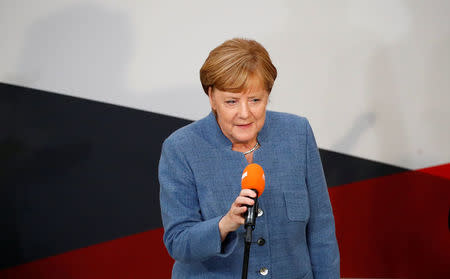As Germans clip Merkel's wings, Brussels braces for turbulence
BRUSSELS (Reuters) - Cheers from Angela Merkel's conservative allies in Brussels at her re-election on Sunday belie wider unease at how the German chancellor will deal with an awkward new coalition and a surge in support for the far-right. "With Angela Merkel, Germany remains the strong and reliable partner in Europe," tweeted Manfred Weber, a Merkel ally who leads the biggest party bloc in the European Parliament. But one source in the European People's Party saw trouble ahead in her need to replace her battered Social Democrat "grand coalition" partners with an alliance of both the left-leaning Greens and the resurgent, economically hawkish liberals of the FDP. "Things worked very smoothly with the socialists," the EPP source said. "Now, you don't know what's going to happen." The broad expectation is for a "Jamaica" coalition -- the country's flag comprises the three parties' colors. Martin Selmayr, German chief-of-staff to European Commission President Jean-Claude Juncker, sent a tweet consisting only of three flags: Jamaica's green, yellow and black flanked by two blue EU banners -- a reflection of hope in Brussels of continued EU commitment from Berlin that some fear may now be problematic. One casualty of Merkel's weakness may be a rapid move to deepen integration of the euro zone along lines that new French President Emmanuel Macron is expected to outline on Tuesday. FEAR OF MORE BAILOUTS Those plans, as with reform proposals floated this month by European Commission President Jean-Claude Juncker, may run into increased scepticism in Berlin, where many are wary of what they see as more demands for German bailouts of states like Greece. Resistance may come both from Merkel's Christian Democrats, spooked by the surge on their right flank, where Alternative for Germany (AfD) entered parliament as the third biggest party, and from the Free Democrats (FDP), whose leader Christian Lindner ruled out Germany contributing to a shared euro zone budget. The liberal leader in the European Parliament, committed federalist and former Belgian premier Guy Verhofstadt, said he hoped for a "pro-European" coalition to push EU integration. The FDP leader in the EU legislature, Alexander Graf Lambsdorff, said it was "an open-minded, pro-European party". The European Greens' German co-chair Reinhard Butikofer said his party wanted to strengthen the European Union, "making use of the window of opportunity that exists ... between Paris, Brussels and Berlin". He was referring to a keynote speech by Juncker 10 days ago in which the EU chief executive said anti-EU populists were in retreat and called for deeper EU integration. But Guntram Wolff, the German director of the Brussels think-tank Bruegel, questioned Juncker's thinking. He forecast a rightward shift in Germany due to the AfD and resistance from the FDP that would stymie Macron and Juncker's grand visions. "Populism definitely not dead," Wolff tweeted. "Juncker speech completely miscalculated the situation." (Reporting by Alastair Macdonald; @macdonaldrtr; Editing by Kevin Liffey)


